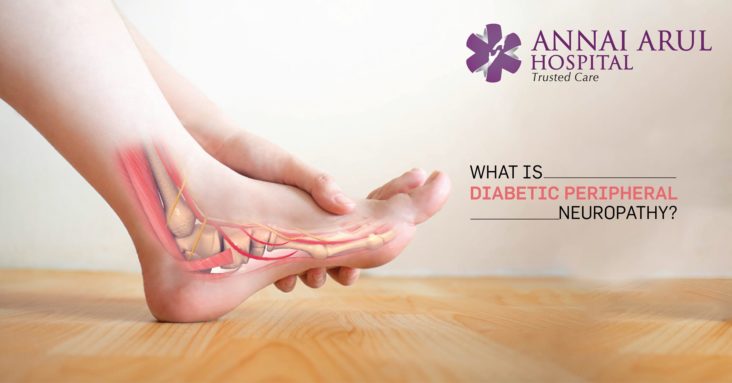One of the effects of unmanaged diabetes is the damage to peripheral nerves, those that help you feel pain, heat and cold. This condition mostly affects the feet and legs. In some cases it may affect the hands and arms also. It causes a tickling or odd feeling in the skin and at the same time cause numbness that will lead to injuries that the person may not realize has happened.
What causes DNP?
DPN the short form for Diabetic Peripheral Neuropathy. A person with diabetes will have high levels of glucose and triglycerides (kind of fat) in their blood. Over time, they damage the nerves that send pain signals to the brain as also the tiny blood vessels that supply the nerves with nutrients. The best way to prevent or delay DPN is to control blood sugar and blood pressure.
Who are at risk?
Nearly 50% of diabetic patients have some kind of nerve damage. Two out of ten people have DPN especially those with a long history of diabetes. A person who is obese, has prediabetes or metabolic syndrome with high blood pressure, high sugar and high cholesterol along with belly fat is a sure candidate for DPN.
What are the symptoms?
The symptoms include a tingling or burning sensation in the feet, toes and fingers. It will feel like ‘pins and needles’. In this condition the slightest touch of something like a bedsheet or a towel can hurt. Later the muscles become weak around the ankles and a person may find it hard to balance or painful to walk. Even though there is nerve damage there may not be very serious symptoms.
How to prevent it?
The best way to prevent DPN or delay its progress is through regular check-ups. You should check every year if you have type 2 diabetes. For type 1 it is best to check every year after puberty or 5 years if you are diagnosed in childhood.
How is it diagnosed?
Since DPN often starts in the feet and legs, the doctor will look for cuts, sores or circulation issues. You will be checked for balance and your walk. It will be checked whether you feel the temperature changes and delicate touches like vibrations. A thin piece of string or a tuning fork will be used for this purpose.
Blood and Urine Test
This will help the doctor to determine the exact blood sugar and triglyceride levels. The tests will be useful in ruling out other causes of DPN like kidney disease, thyroid problems, low B12 levels, infections or cancer.
What is the treatment?
Medicines that is used to control depression and seizures will come in handy to to make the pain from DPN more bearable. Some sprays and ointments used to numb the pain will also help. The nerve damage though cannot be reversed.


